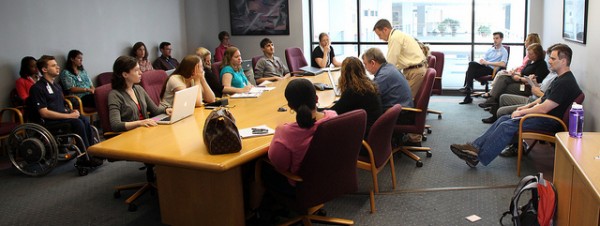One of the greatest challenges with office meetings is that they tend to be far less effective than they’re intended to be. You see, the thing about meetings at the office is that there’s a sense that a lot of talk happened but little was actually done.
This is the reason why many people have some serious issues with attending meetings in the office. In fact, if most meetings weren’t mandatory, you can be sure that most employees wouldn’t even show up at those meetings. So, what can you do to turn that around and make the office meetings more effective?
Discourage All Distractions
In the modern age of instant communication and feedback, many have grown used to being able to check their e-mail, Facebook, or Skype from anywhere they happen to be at the time. However, a person reading an e-mail or otherwise distracted by non-work related matters is not likely to be paying as much attention to the meeting as they should, thus crucial details are lost.
Take control and discourage these distractions – they’re not teenagers after all, they’re professional adults who all know better, they just need a reminder at times.
Take a Cue from the Japanese – Standing Room Only Meetings
Do you know why the Japanese are often referred to as a very effective people? It’s because they don’t talk excessively, and more importantly, hate wasting time. So, you’ll find that most Japanese meetings are held standing up. This is a truly effective and helps people finish their meetings quickly. Most people won’t be able to stand for longer than 45 minutes. So, have your meetings standing up. That way, your meetings can be brief, to the point and effective.
Have a Clear Goal and Theme
The main reason many meetings go on for hours is because there is no clear direction. Avoid this as much as possible. Always come prepared for the meeting with talking points, and clear topics and issues for discussion. A meeting without any direction is bound to go on for hours on end. And the worst part of it is the fact that you really won’t be able to get anything done.
To make this easy, don’t cram every issue onto to the list, just focus on the more important and pressing issues. Try not to have more than 5-7 talking points total for your meeting. More importantly, allocate just 5 minutes for each issue. Outline it, discuss it and ask people to be as succinct or as clear as possible. Hiving this time constraint in place will help people outline their most important points without any fluff.
Choose only a Few Relevant people
There’s no need to get the whole department to come for the meeting – unless it is absolutely necessary. Just choose a few very relevant people and get on with the meeting. Most times, having a crowd often derails the theme of a meeting. A few highly relevant, busy individuals on the other hand, just want to get on with it and get back to work. So, ensure that only those crucial and important to that meeting attend.
The rest can get busy doing some other important things. It also shows a measure of trust in your subordinates: you’re letting them decide if the people below them need to know, instead of pulling their entire team off the floor and potentially compromising productivity.
Don’t Encourage Latecomers
Latecomers can be responsible for the slow pace of a meeting or the unnecessarily long duration. So, try to discourage people from coming in late by not catching them up to speed or doing any recaps. Latecomers don’t deserve it, it isn’t fair to those who came in early, and it actually encourages more people to come late. If they need to know anything, let them ask the others after the meeting.
You could also take a more radical approach such as removing all extra chairs from the room once the meeting starts. This will ensure that all latecomers remain standing for the duration of the meeting.
Meetings can be either productive or time wasting. It all depends on how you plan for and handle the meeting. Follow these tips and you’ll most likely have a meeting that’s effective and productive. Good luck.
Oscar King has spent many years in retail management, and learned a number of tricks to maintaining efficiency in the workplace, and sometimes takes the time to share his tips.
To further maximize efficiency, if you’re still using paper faxes to send e-mails or other important documents, he recommends switching to an online fax service, and to make sure you find the one that best fits your company needs he recommends visiting http://finadafax.com. You can find more about Oscar, including examples of his work, on Google+.



